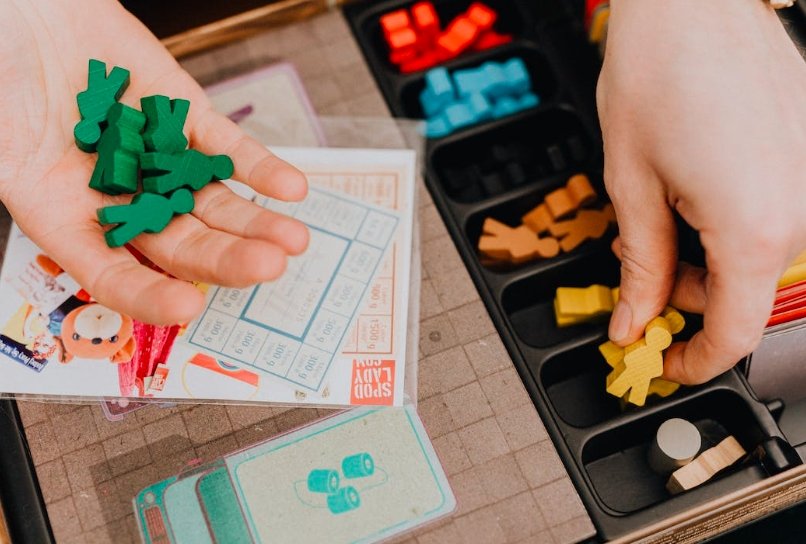Board and card games are a timeless form of entertainment that have been enjoyed by people of all ages for centuries. Board and card games are defined as traditional or modern games typically involving pieces moved or placed on a pre-marked board or other playing surface and cards that are played for amusement or competition. The history of board games dates back to ancient civilizations such as Mesopotamia and Egypt, with some of the oldest surviving examples being The Royal Game of Ur and Senet. Since then, the popularity of board and card games has continued to grow and evolve, with a wide variety of different games available for people to enjoy.
Board and card games have many benefits, both physical and mental. Physically, board and card games can help increase hand-eye coordination, improve dexterity, and increase problem-solving skills. On a mental level, board games can help develop critical thinking skills, improve memory, and increase communication and social skills. Board and card games can even help reduce stress and provide an opportunity to bond with friends and family. Board and card games can provide hours of amusement and entertainment, making them a great way to spend quality time with loved ones.
Board and Beyond: A Guide to Board and Card Gaming is the perfect resource for anyone looking to explore the world of board and card games. This comprehensive guide provides detailed information about the history, rules, and strategies of various board and card games, as well as tips for selecting the right game for you. With Board and Beyond: A Guide to Board and Card Gaming, you’ll be able to enjoy the timeless fun of board and card games for years to come.

Types of Board and Card Games
Strategy Games: Strategy games are board and card games, typically for two or more players, in which the players’ decisions have a high impact on the outcome of the game. Popular examples of strategy games include chess, Risk, and Settlers of Catan. In these games, players must carefully consider their moves and how they will affect the other players. Players must often think several moves ahead in order to anticipate and counter their opponents’ strategies.
Party Games: Party games are board and card games, typically for four or more players, that are designed to be fun and lighthearted. Popular examples of party games include Cards Against Humanity, Jenga, and Apples to Apples. These games often involve trivia, guessing, bluffing, and other activities that require quick thinking and often result in a lot of laughs.
Cooperative Games: Cooperative games are board and card games, typically for two or more players, in which players work together to achieve a common goal. Popular examples of cooperative games include Pandemic, Forbidden Island, and Flash Point. In these games, players must work together as a team in order to complete the game’s objectives. Players must often communicate and strategize in order to succeed.
Deck-Building Games: Deck-building games are card games, typically for two or more players, in which players build their own decks of cards to use in the game. Popular examples of deck-building games include Dominion, Magic: The Gathering, and Star Realms. In these games, players must build their own decks of cards by purchasing cards from a central market. Players must often consider the best combinations of cards to maximize their chances of success.
Top 10 Board and Card Games
Finding the Right Game for You
Choosing the right board and card games can be tricky. Depending on the size of your group, you may want to select a game that is more focused on strategy, or one that requires more luck and chance. There are a variety of games available, so think about what type of game best fits the group you’re playing with. If you’re playing with children, you may want to choose a game that is easy to learn and quick to play. If you’re playing with adults, you may want to opt for a game with more complex rules and strategy.
Setting up a Game Night with Friends or Family
Once you’ve decided on a game, you’ll want to make sure that everyone is on the same page. If it’s a game that requires some assembly, be sure to have all of the pieces and instructions ready before you start. Make sure that everyone understands the rules and is comfortable with the game before you start playing. You may also want to set up a game night schedule so that everyone knows when to gather and you can be sure that the game will be ready to go.
Learning the Rules and Getting Started Playing
Before you start playing, it’s important to make sure that everyone understands the rules. Read through the instructions and ask any questions that you may have. Once everyone is comfortable, it’s time to start playing! Be sure to follow the rules and enjoy the game. If you’re playing with children, you may want to supervise them to make sure that they are playing safely and respectfully.
Top 10 Board and Card Games
Here is a list of some of the most popular board and card games:
• Monopoly
• Scrabble
• The Game of Life
• Chess
• Checkers
• Risk
• Clue
• Apples to Apples
• Uno
• Settlers of Catan
Advanced Strategies for Board Gaming
Board games have been a popular pastime for centuries. While some games are meant to be purely recreational, others require a certain level of strategy in order to win. Advanced strategies for board gaming can help you take your game to the next level.
Strategies for Winning Different Types of Games: Different board games require different strategies. For example, turn-based strategy games like chess or Go require the player to think several steps ahead in order to anticipate the opponent’s next move. Other games such as Monopoly or Risk require the player to manage resources and plan out their next moves. Understanding the basic rules of the game and developing a strategy for success is key to winning.
Tips for Improving Your Gameplay and Decision-Making: Improving your gameplay and decision-making is essential to becoming an advanced board game player. Taking the time to understand the rules of the game and studying the strategies of other players can help you develop your own unique strategies. Additionally, practice and repetition can help you become more familiar with the game and help you make better decisions.
How to Stay Engaged in Long Games: Board games can last anywhere from a few minutes to hours. To stay engaged in longer games, it’s important to establish a strategy and stick to it. Additionally, take breaks if necessary and make sure to have fun. Keeping track of your progress can also help you stay focused and motivated.

Resources for Board Gaming
Websites, Forums, and Social Media Groups for Board Gaming Enthusiasts:
BoardGameGeek.com is the largest board game enthusiast website in the world. It includes a database of over 100,000 board games, reviews from users, forums for discussions, and a marketplace to buy and sell games. Reddit is also a great resource for board game enthusiasts with many subreddits dedicated to various aspects of board gaming, from strategy and tactics to collecting and trading. There are also many Facebook groups and Twitter accounts dedicated to board gaming.
Places to Buy Board Games and Accessories:
Local game stores are the best place to buy board games and accessories, as they often have knowledgeable staff who can help you find the right game for you. Online retailers such as Amazon, Cool Stuff Inc, and Miniature Market are other great places to buy board games and accessories. Local thrift stores and garage sales are also great places to find deals on board games.
Tips for Building a Board Game Collection on a Budget:
The best way to build a board game collection on a budget is to research and shop around for good deals. Look for sales, discounts, used games, and bundles. Many board game publishers also offer discounts on their games directly from their website. Also, consider trading board games with friends and family or trading in old games for store credit. Lastly, follow board game industry news and social media accounts to keep up with the latest releases and deals.
Conclusion
Board and Beyond: A Guide to Board and Card Gaming has been a valuable resource for all board and card game enthusiasts. It has provided both new and experienced players with valuable information on the basics of board and card gaming, as well as offering a range of strategies and tactics for playing various games. It has also provided a wealth of information on the history of board and card gaming, and the many different types of games available.
In conclusion, Board and Beyond: A Guide to Board and Card Gaming has been an invaluable resource for both beginner and experienced board and card game players. It has provided a wealth of information on the basics of board and card gaming, as well as strategies and tactics for playing various games. It has also provided a fascinating look into the history of board and card gaming, and the many different types of games available. With its comprehensive coverage of the subject, Board and Beyond: A Guide to Board and Card Gaming is a must-have for any fan of board and card gaming.
FQAs
1. What type of board and card games does Board and Beyond offer?
Board and Beyond offers a variety of board games, card games, and other family-friendly games. Popular games include Carcassonne, Catan, Pandemic, Clue, Ticket to Ride, and many more!
2. What is the best way to learn how to play board and card games?
The best way to learn how to play board and card games is by watching tutorials online, reading the game’s rules, and asking experienced players for tips and advice.
3. What is the recommended age range for board and card games?
The recommended age range for board and card games varies depending on the game. Generally, board and card games are suitable for adults, teens, and kids aged 8 and up.
4. Are board and card games suitable for solo play?
Yes, many board and card games are suitable for solo play. Games like Solitaire and other single-player card games are perfect for solo play.
5. Where can I buy board and card games?
Board and card games can be purchased from Board and Beyond, local game shops, or online retailers like Amazon.
6. What are the benefits of playing board and card games?
Playing board and card games can help improve critical thinking skills, strengthen social bonds, and reduce stress.
7. How many players can play a board and card game?
The number of players depends on the game. Most board and card games are designed for 2-6 players, but some games can accommodate more.
8. Do board and card games require strategy?
Yes, most board and card games require strategy. The level of strategy required can vary depending on the game.
9. What do I need to play board and card games?
All you need to play board and card games is the game itself, a table or flat surface, and a group of players.
10. What are some of the most popular board and card games?
Some of the most popular board and card games include Catan, Ticket to Ride, Scrabble, Monopoly, Uno, and Clue.


















